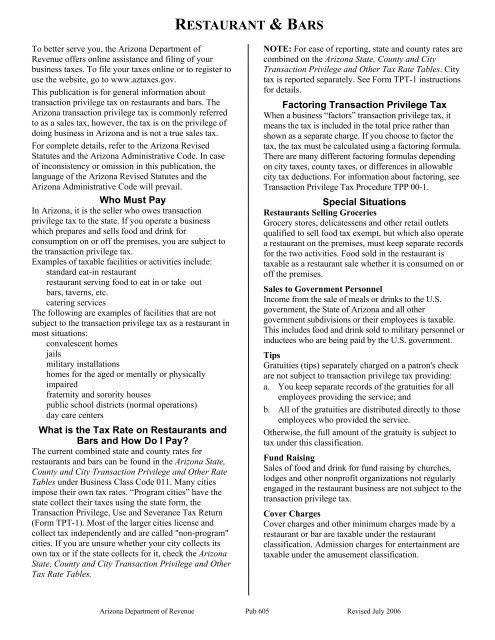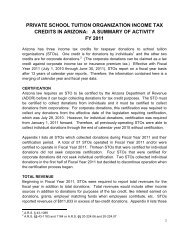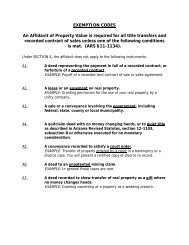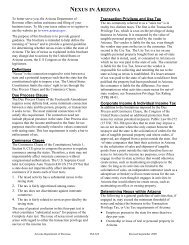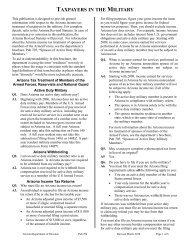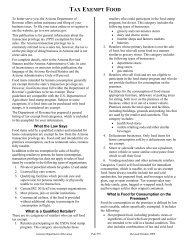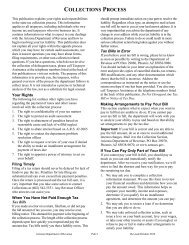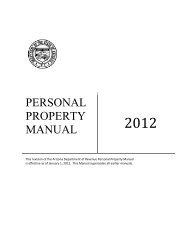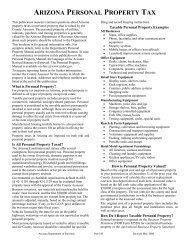RESTAURANT & BARS - Arizona Department of Revenue
RESTAURANT & BARS - Arizona Department of Revenue
RESTAURANT & BARS - Arizona Department of Revenue
Create successful ePaper yourself
Turn your PDF publications into a flip-book with our unique Google optimized e-Paper software.
To better serve you, the <strong>Arizona</strong> <strong>Department</strong> <strong>of</strong><br />
<strong>Revenue</strong> <strong>of</strong>fers online assistance and filing <strong>of</strong> your<br />
business taxes. To file your taxes online or to register to<br />
use the website, go to www.aztaxes.gov.<br />
This publication is for general information about<br />
transaction privilege tax on restaurants and bars. The<br />
<strong>Arizona</strong> transaction privilege tax is commonly referred<br />
to as a sales tax, however, the tax is on the privilege <strong>of</strong><br />
doing business in <strong>Arizona</strong> and is not a true sales tax.<br />
For complete details, refer to the <strong>Arizona</strong> Revised<br />
Statutes and the <strong>Arizona</strong> Administrative Code. In case<br />
<strong>of</strong> inconsistency or omission in this publication, the<br />
language <strong>of</strong> the <strong>Arizona</strong> Revised Statutes and the<br />
<strong>Arizona</strong> Administrative Code will prevail.<br />
Who Must Pay<br />
In <strong>Arizona</strong>, it is the seller who owes transaction<br />
privilege tax to the state. If you operate a business<br />
which prepares and sells food and drink for<br />
consumption on or <strong>of</strong>f the premises, you are subject to<br />
the transaction privilege tax.<br />
Examples <strong>of</strong> taxable facilities or activities include:<br />
standard eat-in restaurant<br />
restaurant serving food to eat in or take out<br />
bars, taverns, etc.<br />
catering services<br />
The following are examples <strong>of</strong> facilities that are not<br />
subject to the transaction privilege tax as a restaurant in<br />
most situations:<br />
convalescent homes<br />
jails<br />
military installations<br />
homes for the aged or mentally or physically<br />
impaired<br />
fraternity and sorority houses<br />
public school districts (normal operations)<br />
day care centers<br />
What is the Tax Rate on Restaurants and<br />
Bars and How Do I Pay?<br />
The current combined state and county rates for<br />
restaurants and bars can be found in the <strong>Arizona</strong> State,<br />
County and City Transaction Privilege and Other Rate<br />
Tables under Business Class Code 011. Many cities<br />
impose their own tax rates. “Program cities” have the<br />
state collect their taxes using the state form, the<br />
Transaction Privilege, Use and Severance Tax Return<br />
(Form TPT-1). Most <strong>of</strong> the larger cities license and<br />
collect tax independently and are called "non-program"<br />
cities. If you are unsure whether your city collects its<br />
own tax or if the state collects for it, check the <strong>Arizona</strong><br />
State, County and City Transaction Privilege and Other<br />
Tax Rate Tables.<br />
<strong>RESTAURANT</strong> & <strong>BARS</strong><br />
NOTE: For ease <strong>of</strong> reporting, state and county rates are<br />
combined on the <strong>Arizona</strong> State, County and City<br />
Transaction Privilege and Other Tax Rate Tables. City<br />
tax is reported separately. See Form TPT-1 instructions<br />
for details.<br />
Factoring Transaction Privilege Tax<br />
When a business “factors” transaction privilege tax, it<br />
means the tax is included in the total price rather than<br />
shown as a separate charge. If you choose to factor the<br />
tax, the tax must be calculated using a factoring formula.<br />
There are many different factoring formulas depending<br />
on city taxes, county taxes, or differences in allowable<br />
city tax deductions. For information about factoring, see<br />
Transaction Privilege Tax Procedure TPP 00-1.<br />
Special Situations<br />
Restaurants Selling Groceries<br />
Grocery stores, delicatessens and other retail outlets<br />
qualified to sell food tax exempt, but which also operate<br />
a restaurant on the premises, must keep separate records<br />
for the two activities. Food sold in the restaurant is<br />
taxable as a restaurant sale whether it is consumed on or<br />
<strong>of</strong>f the premises.<br />
Sales to Government Personnel<br />
Income from the sale <strong>of</strong> meals or drinks to the U.S.<br />
government, the State <strong>of</strong> <strong>Arizona</strong> and all other<br />
government subdivisions or their employees is taxable.<br />
This includes food and drink sold to military personnel or<br />
inductees who are being paid by the U.S. government.<br />
Tips<br />
Gratuities (tips) separately charged on a patron's check<br />
are not subject to transaction privilege tax providing:<br />
a. You keep separate records <strong>of</strong> the gratuities for all<br />
employees providing the service; and<br />
b. All <strong>of</strong> the gratuities are distributed directly to those<br />
employees who provided the service.<br />
Otherwise, the full amount <strong>of</strong> the gratuity is subject to<br />
tax under this classification.<br />
Fund Raising<br />
Sales <strong>of</strong> food and drink for fund raising by churches,<br />
lodges and other nonpr<strong>of</strong>it organizations not regularly<br />
engaged in the restaurant business are not subject to the<br />
transaction privilege tax.<br />
Cover Charges<br />
Cover charges and other minimum charges made by a<br />
restaurant or bar are taxable under the restaurant<br />
classification. Admission charges for entertainment are<br />
taxable under the amusement classification.<br />
<strong>Arizona</strong> <strong>Department</strong> <strong>of</strong> <strong>Revenue</strong> Pub 605 Revised July 2006
Employee Meals<br />
If there is a charge for employee meals, the meals are<br />
subject to the tax. If there is no value received by the<br />
employer and no charge for the meal and the employee<br />
consumes the food and drink on the premises during work<br />
hours, there is no transaction privilege or use tax due.<br />
Coupons<br />
If a restaurant issues and redeems its own coupons<br />
which reduce the cost <strong>of</strong> a meal, only the net selling<br />
price <strong>of</strong> the meal is subject to tax.<br />
However, a restaurant which accepts coupons or dining<br />
cards issued by a dining club or similar establishment is<br />
subject to the transaction privilege tax on the full value<br />
<strong>of</strong> the meal before the discount.<br />
Exemptions<br />
The following transactions are exempt:<br />
1. Sales <strong>of</strong> food or drink prepared for consumption on<br />
the premises <strong>of</strong> any veteran's service organization<br />
chartered by Congress, including auxiliary units.<br />
2. Sales <strong>of</strong> food, drink and condiments for consumption<br />
within state or county prisons, jails or related<br />
institutions.<br />
3. Sales by a person engaged in business under the<br />
restaurant classification to another restaurant, if the<br />
items are to be resold in the regular course <strong>of</strong><br />
business.<br />
4. Sales to hospitals or to licensed health care<br />
institutions operated exclusively for charitable<br />
purposes or operated by the federal or state<br />
government or their political subdivisions are<br />
exempt.<br />
5. Sales <strong>of</strong> food, beverages, condiments and accessories<br />
to commercial airlines, if the items are provided<br />
without additional charge to passengers for<br />
consumption in flight.<br />
6. A deduction is allowed for gross proceeds <strong>of</strong> sales<br />
or gross income derived from prepared food, drink,<br />
or condiment donated by a restaurant to a nonpr<strong>of</strong>it<br />
charitable I.R.C. 501(c)(3) organization that<br />
regularly serves meals to the needy and indigent on<br />
a continuing basis at no cost.<br />
<strong>RESTAURANT</strong> & <strong>BARS</strong><br />
For Additional Information, call:<br />
Phoenix ............................................... (602) 255-2060<br />
Toll free from area codes 520 & 928 .. (800) 843-7196<br />
For Hearing Impaired - TDD only:<br />
Phoenix ............................................... (602) 542-4021<br />
Toll free from area codes 520 & 928 .. (800) 397-0256<br />
Or Write to:<br />
<strong>Arizona</strong> <strong>Department</strong> <strong>of</strong> <strong>Revenue</strong><br />
Taxpayer Information & Assistance<br />
1600 W Monroe<br />
Phoenix AZ 85007<br />
For Related Tax Information:<br />
Internet Address ................................. www.azdor.gov<br />
This publication is available in an alternative format upon request.<br />
<strong>Arizona</strong> <strong>Department</strong> <strong>of</strong> <strong>Revenue</strong> Pub 605 Revised July 2006


